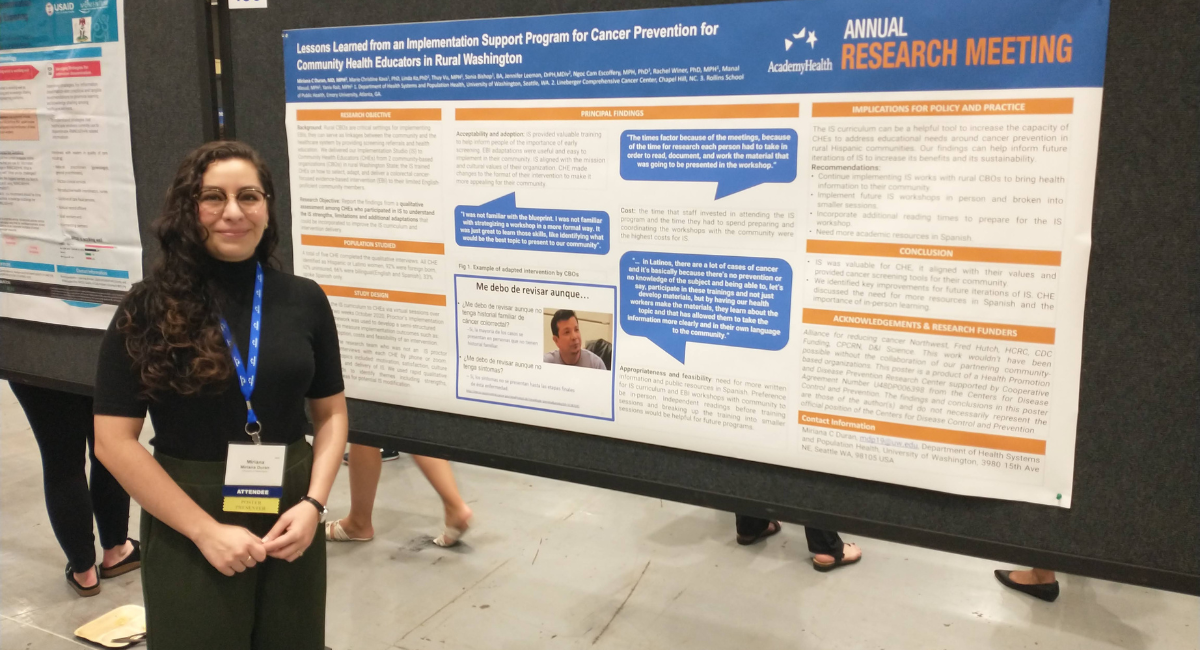
Miriana Duran, PhD student and research scientist with the University of Washington’s Health Promotion Research Center (HPRC), focuses on reducing disparities faced by Latinx communities in Washington. For her PhD, she’s examining the mental health impacts of Seattle’s SmartBucks program.
In her years as a doctor in Mexico, Miriana Duran treated numerous patients suffering from diabetes, hypertension, and other chronic illnesses. She realized that to best care for these patients, she needed to alter the life circumstances that were ultimately causing their ailments.
“I started becoming frustrated when I realized that I didn’t have the skillset to help my patients deal with broader things like social determinants of health," Duran said. "I felt that the public health field would give me the opportunity to have an impact at that greater scale.”
When she moved to the U.S., she knew she wanted to focus on social determinants of health, utilizing her bilingual and bicultural skills. She was drawn to UW for its highly ranked school of public health. Duran has since served as a research coordinator, and now a research scientist at the Health Promotion Research Center. She is currently pursuing her PhD in Health Services, and recently received the Magnuson Scholarship to support her research. The scholarship honors students annually from each of the UW Health Sciences schools on the basis of outstanding academic performance and potential contributions to research in the health sciences.
Professor of Health Systems and Population Health Jessica Jones-Smith says “Miriana’s experience as a physician in Mexico, working with patients with obesity and diabetes, fuels her research interests and provides a valuable perspective. She is able to work collaboratively as part of a team, and is also skilled enough to make great strides in this field independently.”
Creating Culturally Sensitive Interventions for Latinx Communities
Upon becoming a Research Coordinator with HPRC, her first project, in partnership with assistant professor and William L. Dowling Endowed Faculty Fellowship in Health Administration Dr. Maggie Ramirez, adapted a preexisting program geared at caregivers for people with dementia. The program advises caregivers on how to deal with “challenging behaviors,” including aggression or sadness, while also taking care of their own mental health. But the in-person, several hour-long sessions weren’t accessible for all caregivers. So Duran devised how to adapt it to a virtual format.
She explained, “We wanted to see how we could adopt it again, but with the Latinx community because they face other barriers, and in a lot of the research their voices have not been incorporated. Sometimes we end up creating more disparities by creating these amazing programs that only work for one kind of population.”
Duran and her team not only translated the program into Spanish, but also refined the language, videos, and images to be culturally sensitive. Using everyday terminology and avoiding academic jargon was key. Community members provided feedback at all stages of the project.
For another project, she partnered with community-based organizations specializing in outreach to Spanish-speaking communities in rural Washington. Duran led a workshop to teach community health workers about cancer prevention, and how to design and implement their own evidence-based interventions. One team chose to focus on breast cancer, and designed culturally sensitive curricula highlighting the risks faced by Latina women of different ages.
As Duran explained, learning from the expertise of community health workers was key. “They know the challenges they face when they want to get a cancer screening, so it was really exciting to work so closely with the community,” she said.
Learn more about Miriana Duran's PhD research on the Health Systems and Population Health website